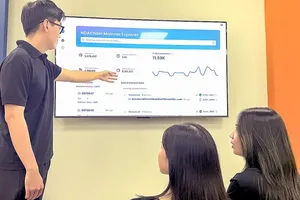
Lately, Bkav Corporation, a giant Vietnamese company on cyber security and software development, has reported that it continuously receives support requests from victims who lost Facebook accounts, all of whom experienced the same scenario of being attracted by sexy comments from evil people and accessing those criminals’ page. The company’s statistics show that the quantity of such ill-intentioned comments in 2019 significantly increases compared to the previous year, regardless of Facebook’s constant effort to erase fake accounts.
Alarmingly, phishing attacks, aiming to steal sensitive information from users, are still devastatingly effective. Reports from Kaspersky Vietnam display that in the first haft of 2019, Vietnam led the most affected nations by fraudulent websites, followed by Malaysia and Indonesia, with the total attacks of more than 11 million.
Many businesses in Vietnam are also facing a grim challenge of spam and scam emails. Evil people are taking advantage of security vulnerability in application and evaluation forms of these companies to insert spam content or scam links. This not only results in confidential information leak but also leads to prestige loss, which is truly serious.
Therefore, Bkav Corporation warns that Internet users of social networks not click any suspected links from strangers, even if these links are posted on famous pages with a large number of followers. Regarding links sent by acquaintances, users need to actively double-check with senders to ensure they are safe. Security features on famous social networks like Facebook are suggested to be turned on.
Kaspersky Vietnam also cautions people that phishing attacks can be avoided if cyber users always stay alert and check any suspicious email or form, especially those sent by banks, before filling in their own personal information.
In order to identify harmful emails, receivers need to cautiously look at the email address, not senders’ name since these can be faked easily. In addition, the content of these emails are normally prepared or translated using low-quality software. The links in these emails are also quite abnormal or shortened, along with attractive content.
Internet users are recommended to keep two active email addresses, one of which for official use and the other for websites to read news or collect information. This is because 1.6 per 10 received emails contain malware, reported Bkav Corp.
Smart device users are advised to be careful with spam messages since these pieces can lead them to certain fraudulent websites which will then access their address book or applications. These attacks are done easily since owners of those devices do not pay enough attention to cyber security safety, as said by Mr. Yeo Siang Tiong from Kaspersky Vietnam.
























